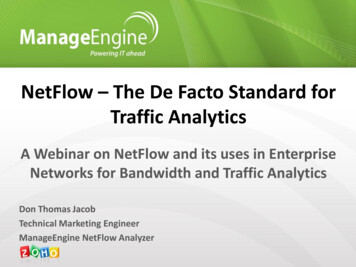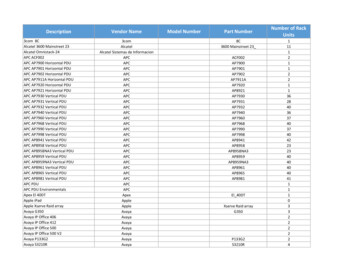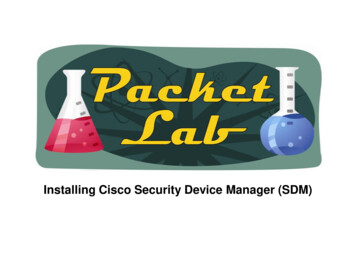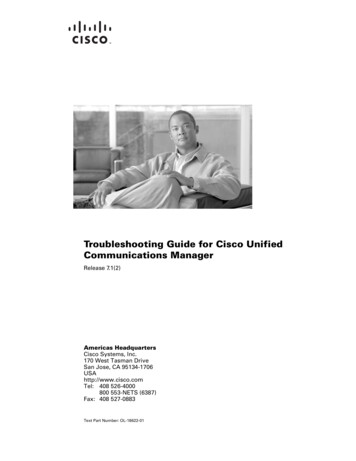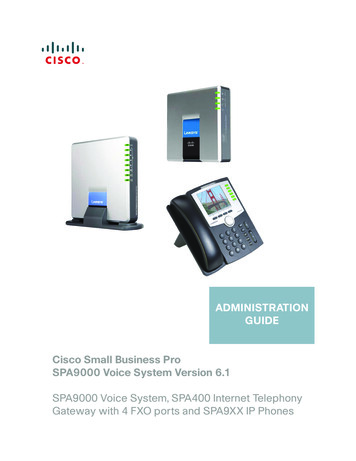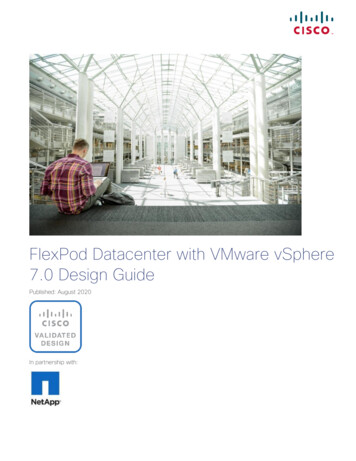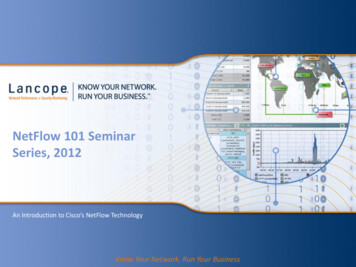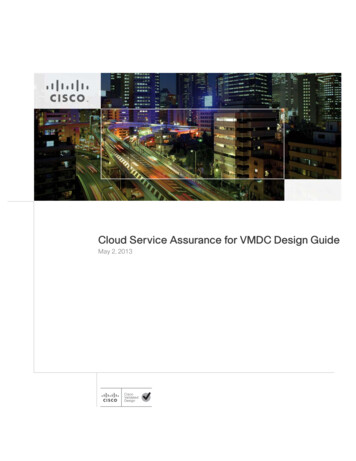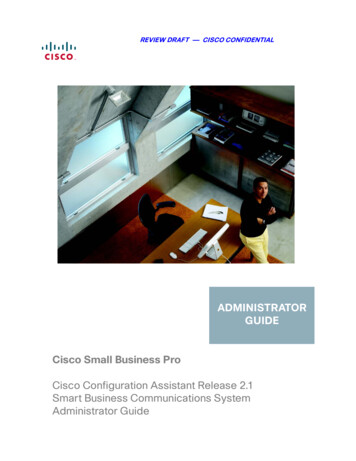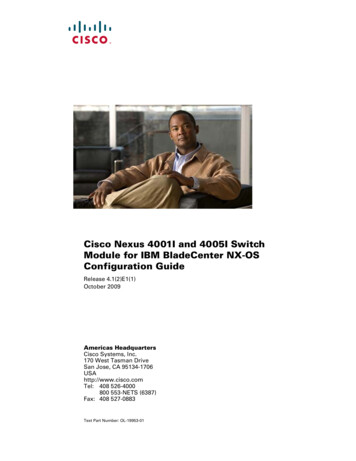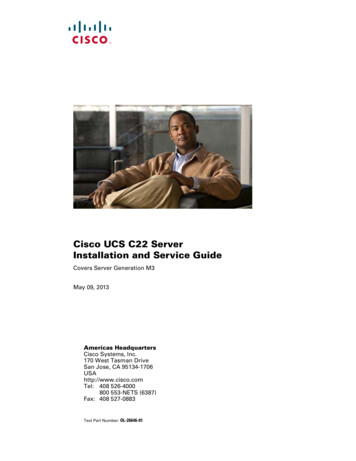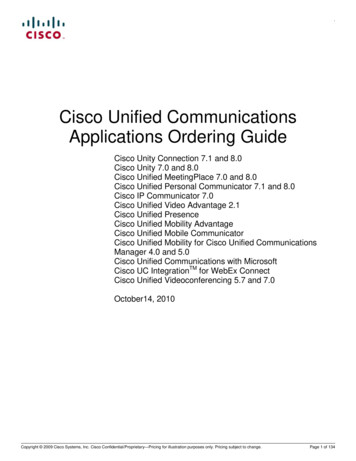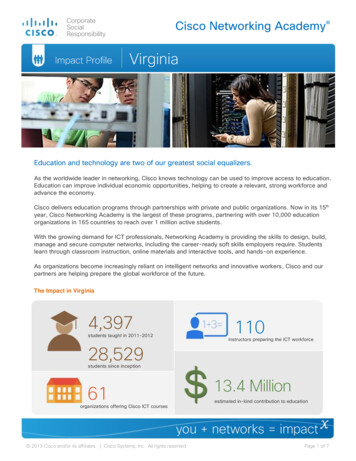
Transcription
CorporateSocialResponsibility VirginiaEducation and technology are two of our greatest social equalizers.As the worldwide leader in networking, Cisco knows technology can be used to improve access to education.Education can improve individual economic opportunities, helping to create a relevant, strong workforce andadvance the economy.Cisco delivers education programs through partnerships with private and public organizations. Now in its 15thyear, Cisco Networking Academy is the largest of these programs, partnering with over 10,000 educationorganizations in 165 countries to reach over 1 million active students.With the growing demand for ICT professionals, Networking Academy is providing the skills to design, build,manage and secure computer networks, including the career-ready soft skills employers require. Studentslearn through classroom instruction, online materials and interactive tools, and hands-on experience.As organizations become increasingly reliant on intelligent networks and innovative workers, Cisco and ourpartners are helping prepare the global workforce of the future.The Impact in Virginia4,397110students taught in 2011-2012instructors preparing the ICT workforce28,529students since inception13.4 Million61estimated in-kind contribution to educationorganizations offering Cisco ICT coursesyou networks impact 2013 Cisco and/or its affiliates. Cisco Systems, Inc. All rights reserved.Page 1 of 7
Academy Impact Profile 2013VirginiaPreparing Today’s Students for Tomorrow’s ChallengesFor a competitive and sustainable economy, the United States must have a skilledand well-trained workforce that can meet the evolving needs of industry. Studentsmust now acquire problem-solving and critical-thinking skills, in addition tospecific job-related expertise, to reach their full potential as a vital work resource.The growth of global networks has resulted in a shortage of people qualified todesign, build, manage and secure the information infrastructure needed to dobusiness, support communications, and even save lives. Every business, school,hospital, nonprofit, and other organization that relies on intelligent networks needstrained professionals to keep them running and secure.A workforce that is well-schooled in information and communications technology(ICT) and engineering can spur innovation across many industries, which in turninspires additional opportunities to fuel productivity and economic growth. ICTinvestments are expected to play a major role in generating stable, high-payingjobs and boosting the nation’s GDP.An Innovative Education Program that Supports StandardsCisco Networking Academy is a technology education program that partners withpublic and private organizations to provide the knowledge and skills required forcareer- and college-ready students. Students acquire basic-to-advancedknowledge of information communications technology and learn networking skills.They develop the analytic, teamwork, and efficiency skills and the self-confidencethat are so essential in the 21st century, both in the job world and in college.Coursework reflects all STEM Cluster Topics, and teaches many of the reading andwriting Common Core Standards for technical subjects. College-ready studentsstrengthen their understanding of technology, as well as math, science, andengineering concepts, improving success in their advanced studies. Career-readystudents prepare for globally recognized certifications.“Cisco is the firstvendor to offer a robustnetworking certificationportfolio that meets theANSI accreditationstandard.”Yahoo! Finance1/16/2013“Most of my students getmultiple job offers beforethey even graduate.”David Kotfila,Director/Instructor,Rennselaer PolytechnicInstitute, NYTechnical and Career-Ready SkillsCourses include IT Essentials, Cisco CCNA (Cisco Certified NetworkingAssociate), CCNA Security, and the more advanced Cisco CCNP (Cisco CertifiedNetworking Professional).With a focus on learning technical skills, the instructional approach encouragesstudent engagement and the ability to synthesize what they learn and apply it inother contexts. Course content integrates four skill areas identified by educationresearchers as critical for 21st century workers: Problem solving and decision making: Students practice and test their knowledge by configuringand troubleshooting networks using hands-on labs and simulation software; real-world scenariosdevelop advanced problem-solving techniques.Creative and critical thinking: Students understand the how and why of networking by combininghands-on learning with conceptual and analytical exercises.Collaboration, communication, and negotiation: Students acquire individual and teamwork skillsby performing lab exercises and practicing problem solving within business scenarios.Intellectual curiosity and information handling: Students develop the ability to locate, select,structure, and evaluate information.Courses also prepare and motivate students to pursue further education or certification. Many go on to apply theirskills on the job or in their own businesses. 2013 Cisco and/or its affiliates. Cisco Systems, Inc. All rights reserved.Page 2 of 7
Academy Impact Profile 2013VirginiaComprehensive Curricula with Communities of SupportEach course is free to not-for-profit organizations and includes instructor-led course content, lab exercises,simulation software, skills assessments, case studies, gaming, interactive teaching guides, and grade books. Allmaterials are available to instructors online with 24/7 support.Unique to Networking Academy is our focus on instructor professional development, and the creation ofcommunities to support both instructors and students. Instructors receive training prior to teaching their firstclass, and many free professional development opportunities throughout the year. Cisco hosts peer communitiesthat enable instructors to collaborate and share best practices, online and in person. Students have access toskills competitions and a global network of peers to troubleshoot coursework and prepare for exams, while alsomentoring and encouraging one another.A High Demand for ICT SkillsAlthough economic downturns hinder most employment sectors, ICT professionals enjoy a continuouslyincreasing demand because of exponential growth in technology and related services. Networking is expected tobe the second fastest growing ICT area in the United States, faster than the average for all occupations, as wecontinue to invest in cloud and mobile networks.2020 U.S. Employment Predictions1 28% 18% 22% 22% 18% 22% 14%443,800Network andComputer sts664,800ComputerSystemsAnalysts367,900Info Sec Analysts,Web Developers,NetworkArchitects363,700Comp andInfo SysManagersAllComputerOccupationsAllOccupations 35% 28%2020 Virginia Employment Predictions 36%12 25%2 31%Source: US Department of Labor, Bureau of Labor Statistics, www.bls.gov/emp/ep table 108.htmSource: Virginia Employment Commission, www.vawc.virginia.gov/gsipub/index.asp?docid 407 (Industry-Occupation Projections, occprj.zip)Top Cisco Certifications by Salary3ICT salaries are on the rise, particularly if professionals have specialized training or have earned a certification.For example, Cisco network administration knowledge and skills result in a 9% higher salary, on average. 90,457 82,923 74,7643Additional Cisco certifications are available,including CCNA Security, CCNA Voice,CCIE, CCDA, and more.Source: Global Knowledge, 15 Top Paying IT Certs, d 3158&country United States 2013 Cisco and/or its affiliates. Cisco Systems, Inc. All rights reserved.Page 3 of 7
2013 Academy Impact ProfileVirginiaThe Impact in VirginiaThe partnership between Cisco and Virginia educational institutions has touched the lives of more than 28,500students and generated a large estimated in-kind contribution towards education.Impact since the beginning in 199728,529Students 13.4MEstimated In-Kind Contribution Value1-11 (100%)Congressional Districts ParticipatingImpact over the last 12 16%Female %Community-based organizations, middle schools, military, nontraditional educational settings, and post-graduate institutionsStudents that enroll in more than one education level or curriculum in 12 months may be counted more than onceEducation Organizations Teaching Networking Academy Courses in VirginiaCOUNTYCITYSCHOOLAnnandaleNVCC - Annandale CampusEdison AcademyChantillyChantilly AcademyFairfaxGeorge Mason UniversityNVCC - Alexandria CampusFalls ChurchMarshall AcademySalvation AcademyFranklinPaul D. Camp Community CollegeRocky MountFranklin County High SchoolMarymount ifton othianDanvilleDanvilleFairfaxTC Williams High SchoolDabney S. Lancaster CommunityCollegeDeVry University, Arlington (ACC)Westwood College Arlington BallstonVAB (ACC)Year Up National Capital RegionBedford Science & TechnologyCenterVirginia High SchoolBuchanan County Technical andCareer CenterCampbell County Tech CenterFranklinCareer Training Solutions mas Nelson Community CollegeHarrisonburgHarrisonburgLeeBen HurLoudounLeesburgMassanutten Technical CenterLee County Career and TechnicalSchoolMonroe Technology CenterLynchburgLynchburgCentral Virginia Community CollegeManassasManassasOsbourn High SchoolChesterfield Technical CenterMartinsvilleMartinsvilleBoys and Girls Club of the Blue RidgeMatoaca High SchoolNewport NewsNewport NewsECPI University Newport News (ACC)John Tyler Community CollegeNorfolkNorfolkPittsylvaniaChathamGermanna Community CollegeDanville Community CollegeGeo. Washington High School 2013 Cisco and/or its affiliates. Cisco Systems, Inc. All rights reserved.Fredericksburg City SchoolsNorfolk State UniversityYMCA of South Hampton RoadsPittsylvania Count VoTechPage 4 of 7
2013 Academy Impact ProfilePrince WilliamHaymarketBattlefield High School - VAManassasNVCC - Mannasas CampusQuanticoDoDEA/ USA - Quantico High azewellTazewellForest Park High SchoolNVCC - Woodbridge CampusJ. Sargeant Reynolds CommunityCollegeMeadowbrook High SchoolRoanokeRoanokeVirginia Western Community CollegeScottGate CityShenandoahMount tt CountyTriplett Business and TechnicalInstituteSpotsylvania Career & TechnicalCenterBrooke Point High SchoolVirginia BeachVirginia BeachSouthwest Virginia CommunityCollegeTazewell County Career TechnicalCenterCenter for Information DominanceDam Neck, U.S. NavyECPI University Virginia Beach (ACC)Tidewater Community College VBVirginia Beach SchoolsWarrenFront RoyalWashingtonAbingdonWiseWytheBlue Ridge Technical CenterNeff Center for Science & TechnologyWashington County Technical SchoolBig Stone GapMountain Empire Community CollegeWiseWise County Vocational CenterWythevilleWytheville Community CollegeAcademy Impact StoryAs Cisco Networking Academy turns 15, we look back to see how far we’ve come. We see millions of students,each with a unique educational experience and a track record of accomplishments beyond the classroom. Theirstories are our story.Role Models and Relevant Courses Inspire a Reluctant StudentStephen Lynch credits supportive mentors and reality-based curricula with setting him on the pathto becoming a networking expert—and a mentor in his own right.Since the first classes began in 1997, Cisco Networking Academy has thrived on closecollaboration among faculty, students, Cisco team members, community organizations,and business partners. Academy alumni also play an important part, serving as rolemodels, coaches, advisors—and business recruiters who can help launch graduates on asuccessful career path. Cory Gray is one such alumni mentor, and mentee StephenLynch is carrying his spirit forward.In 2006 Stephen Lynch was a high school student in Virginia Beach, Virginia, looking forsome direction. “I was one of those people who got bored easily,” Lynch says. “I alwayswanted to do more.” Pursuing his extracurricular interests, he started a web hostingcompany and founded two popular software developer communities while he was still inhis mid-teens. But, by his own admission, he was not an engaged student. “I didn’t enjoythe traditional high school courses because they weren’t relevant to my life,” he recalls.“They didn’t seem to be of any practical use.” He thought college would just be more ofthe same. He was uncertain where the future would take him.“Taking theacademy courseswas the bestdecision I evermade. It hasdefined mycareer, myfuture, andmy life.”Then Lynch heard about the Virginia Beach Advanced Technology Center (ATC), an academic and vocationalprogram for high school and college students that offers the Cisco CCNA Discovery and Exploration curricula forCisco certified networking associates. In addition to his high school classes, Lynch undertook the two-yearcourse of study offered at ATC. “Taking the academy courses was the best decision I ever made,” he says. “Ithas defined my career, my future, and my life.”Enter Cory Gray, currently a Cisco network consulting engineer who holds Cisco’s prestigious networkingcertification, the Cisco CCIE for Cisco certified internetwork experts. Gray had also taken the academy coursesat ATC while in high school. He now returns to the Virginia Beach Public Schools regularly as a mentor andadvisory board member. Gray was recognized by the ATC as Volunteer of the Year in 2006.Lynch met Gray while he was working on his senior ATC project, known as Caspian. Academy classroom and labprojects combine technical and soft skills in cutting-edge business scenarios. The Caspian project that year 2013 Cisco and/or its affiliates. Cisco Systems, Inc. All rights reserved.Page 5 of 7
2013 Academy Impact ProfileVirginiacalled for designing a gaming network encompassing five cities, including development of a prototype, andrunning a real game on it. Seniors then defended the design in front of a panel of network and business experts.These working professionals add tremendously to the learning experience. “If they hadn’t been involved, wewouldn’t have put the same level of effort into the project,” says Lynch. Gray was one of the experts on theCaspian panel. The two stayed in touch, and Gray offered advice and moral support as Lynch proceeded with hisnetwork education, found a part-time job with a local Cisco Gold Certified Partner, ABS Technology Architects,and acquired a succession of Cisco certifications which are highly prized by technical groups in industry andgovernment.When Lynch began taking Networking Academy courses, he was still dubious about school and uncertain aboutwhat he wanted for a career. However, he was immediately attracted to the academy’s method of instruction,particularly the hands-on labs and team projects. “The academy courses focus on workplace skills and technicalmaterial you can actually use,” he says. “Students are becoming increasingly more intrigued by such programs.”When he found out how valuable Cisco certifications are in the professional world, Lynch decided to take theCisco CCENT examination for Cisco certified entry network technicians, while he was still in his first year ofacademy studies. He was surprised when, despite his entrepreneurial track record and his proven computerskills, he didn’t pass on the first try. The setback proved temporary. He redoubled hisefforts and passed the exam easily a few months later. It was 2007, and he was just 17“I go back to theyears old.It wasn’t long before he powered forward to achieve the more advanced CCNAcertification in 2008, his junior year in high school. The next year he obtained the CiscoCCNP certification for Cisco certified network professionals. Each of these certificationsrequires rigorous written and hands-on exams, and Lynch passed both on the first try.academy as amentor, and identifywho is going to bereally successful. Itmotivates me tocontinue myeducation andbroaden myskill set.”After high school graduation, when Lynch decided to go for the top-level CCIEcertification, Gray again offered his advice and support. Lynch prepared over the course oftwo years, amassing 900 pages of notes and putting in 3000 lab hours. He fell short on hisfirst attempt, but he persevered, receiving the certification (CCIE Routing/Switch #36243)on his second try in August 2012, at age 21. He is one of the youngest professionals ever to do so. (Grayqualified for his CCIE at 24.) “It takes a lot out of you to get there, but it means a lot once you do,” Lynchobserves. Gray recalls, “I knew he was special, but I had no idea how much he would accomplish so soon.”Unexpectedly, Lynch came to value the nontechnical and soft skills he developed in Networking Academycourses as much as the technical content. Subjects he found boring in a traditional classroom setting were moreuseful and enjoyable in a technology environment. “I needed verbal skills to write emails and make presentations.I needed math for subnetting [configuring logical network topologies],” he says. “I needed science to understandthe future of technology. The more I learned about networks, the more I valued the skills that went along with thatknowledge.”Spurred on by this new appreciation for a broad education, Lynch enrolled as an undergraduate at George MasonUniversity (GMU), where he is studying information technology and business. He expects to graduate in 2014.Meanwhile, he is studying for other CCNA certifications with a particular interest in network design, security andwireless before working full-time after graduation as a network engineer at ABS Technology Architects.Lynch also benefitted from a second mentor: Trent Dorroh, the talent acquisition and vendor relationship managerat ABS Technology Architects. Dorroh volunteers at ATC, and has motivated Lynch throughout his time at thecompany to make sure Lynch had all the time and equipment he needed to practice for his certifications. ABSallowed Lynch almost two months of full-time paid study time to prepare for the CCIE. The company also aidedhim with tuition reimbursements, and sent him to the annual Cisco Live customer appreciation event, where heconnected with fellow CCIE professionals and dove into world-class technical seminars. 2013 Cisco and/or its affiliates. Cisco Systems, Inc. All rights reserved.Page 6 of 7
2013 Academy Impact ProfileVirginiaLynch hopes to qualify for the Networking Academy “Dream Team” next year at Cisco Live.The Dream Team is an elite group, consisting of 10 students and one instructor, who areselected from dozens of applicants across the United States and Canada. The team workswith Cisco engineers to help build and troubleshoot the massive Network Operations Center(NOC) that supports exhibits as well as approximately 15,000 global attendees.Lynch is doing his part to give back by staying active in the academy program andmentoring students at ATC. He has been certified as a Networking Academy instructor(Cisco CCAI certification), and is helping GMU staff develop the university into a regionalsupport center for surrounding schools offering academy courses. He is working towardsbecoming “Instructor Training Qualified ITQ”, which allows him to teach other instructors. Healso wants to help extend the Caspian senior project concept to other Networking Academyschools around the world.“I’m inspired by the new students that come through the academy,” he says. “I go back tothe academy as a mentor, and try to identify who is going to be really successful. Itmotivates me to continue my education and broaden my skill set. The academy students areexactly what companies like ABS Technology Architects are looking for. I just hope I canencourage someone else in the same way Cory and Trent have encouraged me.” His adviceto other students following the same track: “You need to put the time in, understand theconcepts, gain hands-on experience, identify not only how technologies work, but how theyare used in business, and stay motivated, all while keeping your goals in mind. However, inorder to be truly successful, you have to enjoy the experience.”Trent Dorroh,talent acquisitionand vendorrelationship managerat ABS TechnologyArchitects, says:“I find greatsatisfaction inhelping young,motivatedindividualsrealize their fullpotential in life.ABS is able toidentify rising,talentedengineers andprovide themwith careeropportunities.”At the 15 year milestone, Networking Academy has compiled an institutional historyenlivened by a growing cohort of alumni who have gone on to contribute to theircommunities and local economies. Stephen Lynch, Cory Gray, and Trent Dorrohdemonstrate how that tradition is now being carried forward from one generation ofstudents, instructors, mentors, and role models to the next.Group photo on right: Instructor John B. Nelson received a plaque from Cisco alumni for ten years ofservice. (From left to right) Walker Dorroh, CEO, ABS Architects; Cory Gray, CCIE; John Nelson, ATC;Stephen Lynch, CCIE; Trent Dorroh, Director of Implementation Services, ABS ArchitectsLearn MoreSee videos and success stories.Learn how to get isco Corporate Social ResponsibilityWe believe that businesses have a responsibility to operate in ways that respect and ultimately benefit people,communities and the planet we live on; we call this Corporate Social Responsibility (CSR). Our core CSR philosophy isthat impact multiplies whenever human and technology networks combine to solve a problem.This is why we approach CSR the same way we approach business – by applying our technology, employee expertise andpartnerships. We are focused on four primary goals: improving the well-being of people and communities around theworld, reducing our environmental impact and helping our customers do the same, conducting our business ethically, andcreating a workplace where our employees thrive. 2013 Cisco and/or its affiliates. Cisco Systems, Inc. All rights reserved.Page 7 of 7
Cisco delivers theducation programs through partnerships with private and public organizations. . middle schools, military, nontraditional educational settings, and post-graduate institutions 5 Students that enroll in more than one education level or curriculum in 12 months may be . Lynchburg Lynchburg Central Virginia Community College
